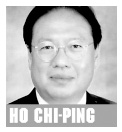Pursuing the real Chinese dream
Updated: 2010-12-29 07:09
(HK Edition)
|
|||||||||

What is the Chinese dream? Helen H Wang, a Forbes contributor, consultant and expert on China's middle class recently published a book titled The Chinese Dream: The Rise of the World's Largest Middle Class and What It Means to You. In her book, she discusses a wide variety of subjects on the rising Chinese middle class and explores its implications in economics, the environment, culture and politics. And she concludes that "middle-class Chinese and Westerners are connected by a common set of core values and share many of the same aspirations and dreams." The Chinese dream is somehow "a copy of the American dream".
Many middle-class Chinese are enamored with the American way of life as portrayed by TV commercials, the Internet and Hollywood movies, and set that as a standard for success. One Chinese blog described American middle class as: "...living in a villa with a two-car garage in the suburbs with a lawn in front of their house. They have two to three children, and a dog. The husband goes out to work, and the wife stays at home taking care of the children. On weekends, they drive their SUVs to the countryside for barbecues and camping." What a fascinating but less-than-accurate picture it is! It conveniently forgets that only recently many "middle-class Americans" had to endure below par housing and found their personal financial situation messy in view of the foreclosures and bank crises. I simply refuse to accept the fact that the average middle-class Chinese dream American dreams.
With its economy getting much stronger by the day, China is experiencing a period of transition. The West, on the other hand, is fast losing its aura and pre-eminence. It is worried about China's rise but unsure as to what the Chinese people really want. The West can understand China only if they are prepared to see things through the prism of a true Chinese who is aware of his cultural roots. So far, the West has only misled itself by attempting to fathom the Chinese through its own value systems. This never works with a country of a 5,000-year history and culture, whose people treat societal harmony and peaceful co-existence between individuals and nations as sacred guiding principles. It is also noteworthy that China has never annexed another country or dominion even when it has the wherewithal to do so.
And I believe such noble aspirations are fundamental to those who feel proud to be Chinese. The real Chinese dream is to see rejuvenation of Chinese culture and national pride. What I would like to see is the emergence of Chinese soft power to further the propagation of Chinese culture and traditional values which played such a crucial role in the nation's revitalization over the past 30 years.
The author is former secretary for home affairs of the Hong Kong SAR government.
(HK Edition 12/29/2010 page2)